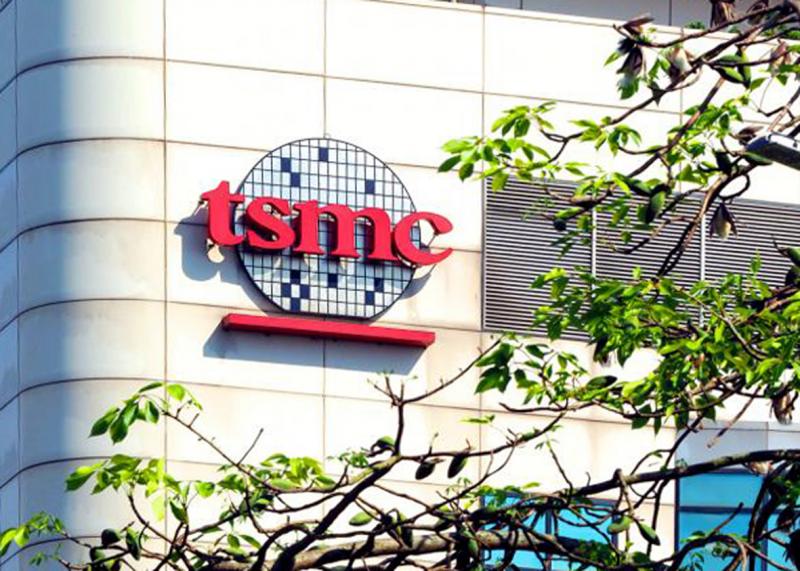Taiwan Semiconductor Manufacturing Co (TSMC, 台積電) yesterday said it is to open a new cutting-edge research-and-development (R&D) center in Hsinchu next year to develop 2-nanometer (nm) technology to secure its technology leadership.
The world’s biggest contract chipmaker said it is also seeking to acquire land adjacent to the new R&D center to build a production fab for 2-nanometer chips.
This is the first time that TSMC has disclosed details about its plans to move into 2-nanometer technology.

Photo: David Chang, EPA-EFE
The company has invested heavily in R&D and advanced capacity, offering 7-nanometer chips in 2018 and 5-nanometer chips this year, with plans to commence volume production of 3-nanometer chips in the second half of 2022, to maintain its edge over competitors such as Samsung Electronics Co.
The 2-nanometer chips are one generation more advanced than 3-nanometer ones.
The new R&D center, dubbed TSMC’s “Bell Lab,” is to house 8,000 scientists and engineers to develop next-generation chip technologies, TSMC senior vice president Kevin Zhang (張曉強) yesterday told an online technology symposium.
It is to be composed of two R&D sections — R1 and R2 — and one office building, the company said.
R1 is under construction and is to become operational next year, Zhang said.
It will serve as the base for TSMC to explore 2-nanometer technology and future generation technologies, TSMC senior vice president Y.P. Chin (秦永沛) said.
TSMC has spent more than US$10 billion a year on expanding advanced technology capacity over the past few years to meet customers’ demand, Chin said.
The investment allowed TSMC to increase its advanced technology capacity at a compound annual growth rate of 28 percent from 2016 to this year, he said.
To cope with robust demand, the chipmaker has continued to expand its 7-nanometer technology capacity, which is expected to be 3.5 times bigger than when it introduced the technology in 2018, Chin said.
The 5-nanometer technology capacity is forecast to grow 1.8 times in 2022, compared with this year’s capacity, he added.
To date, TSMC has shipped more than 1 billion 7-nanometer chips, the company said.
“If you have a 5G phone, most likely the phone is powered by TSMC’s 7-nanometer chips,” Zhang said.
As semiconductor technology is evolving rapidly and becoming increasingly complex, TSMC has been boosting R&D spending to ensure it is able to offer the most advanced technologies to its clients now and for the years to come, Zhang said.
The chipmaker spent US$2.96 billion on R&D last year, up 3.86 percent from 2018, Chang’s presentation showed.
Its R&D headcount also rose to 5,901 last year from 5,609 in 2018, it showed.
Tainan is a major manufacturing hub for the company’s advanced technologies.

A magnitude 5.6 earthquake struck off the coast of Yilan County at 12:37pm today, with clear shaking felt across much of northern Taiwan. There were no immediate reports of damage. The epicenter of the quake was 16.9km east-southeast of Yilan County Hall offshore at a depth of 66.8km, Central Weather Administration (CWA) data showed. The maximum intensity registered at a 4 in Yilan County’s Nanao Township (南澳) on Taiwan’s seven-tier scale. Other parts of Yilan, as well as certain areas of Hualien County, Taipei, New Taipei City, Taoyuan, Hsinchu County, Taichung and Miaoli County, recorded intensities of 3. Residents of Yilan County and Taipei received

Taiwan has secured another breakthrough in fruit exports, with jujubes, dragon fruit and lychees approved for shipment to the EU, the Ministry of Agriculture said yesterday. The Animal and Plant Health Inspection Agency on Thursday received formal notification of the approval from the EU, the ministry said, adding that the decision was expected to expand Taiwanese fruit producers’ access to high-end European markets. Taiwan exported 126 tonnes of lychees last year, valued at US$1.48 million, with Japan accounting for 102 tonnes. Other export destinations included New Zealand, Hong Kong, the US and Australia, ministry data showed. Jujube exports totaled 103 tonnes, valued at

BIG SPENDERS: Foreign investors bought the most Taiwan equities since 2005, signaling confidence that an AI boom would continue to benefit chipmakers Taiwan Semiconductor Manufacturing Co’s (TSMC, 台積電) market capitalization swelled to US$2 trillion for the first time following a 4.25 percent rally in its American depositary receipts (ADR) overnight, putting the world’s biggest contract chipmaker sixth on the list of the world’s biggest companies by market capitalization, just behind Amazon.com Inc. The site CompaniesMarketcap.com ranked TSMC ahead of Saudi Aramco and Meta Platforms Inc. The Taiwanese company’s ADRs on Tuesday surged to US$385.75 on the New York Stock Exchange, as strong demand for artificial intelligence (AI) applications led to chip supply constraints and boost revenue growth to record-breaking levels. Each TSMC ADR represents

TRUST: The KMT said it respected the US’ timing and considerations, and hoped it would continue to honor its commitments to helping Taiwan bolster its defenses and deterrence US President Donald Trump is delaying a multibillion-dollar arms sale to Taiwan to ensure his visit to Beijing is successful, a New York Times report said. The weapons sales package has stalled in the US Department of State, the report said, citing US officials it did not identify. The White House has told agencies not to push forward ahead of Trump’s meeting with Chinese President Xi Jinping (習近平), it said. The two last month held a phone call to discuss trade and geopolitical flashpoints ahead of the summit. Xi raised the Taiwan issue and urged the US to handle arms sales to